人教版九年级英语Unit1、Unit2 知识归纳总结精编版
人教版九年级英语Unit 1-2 知识点归纳

compare with拿…和…比较
connect…with…把……和……连接或联系起来
call out大声呼喊
dependon视.......而定;取决于;依靠;依赖
dressup乔装打扮dress up as
endup with..以....结束
end up最终成为;最后处于
be stressed out焦虑不安的
be used to do=be used for doing被用来做某事
be good at在....方面擅长
be/get used to doing习惯于做某事
名词短语
have a hard/difficult time in doing
have conversations with sb.同某人谈话
flyup to飞向fly-flew-flown flight n.
give away分发,赠送
give/hand out分发发放hand in上交
lay out摆开布置ຫໍສະໝຸດ make/earn money挣钱
make/let/have sb do sth让某人做某事
————————变被动还原to
give/pass/send/write/lend/show/offersth to sb.= .....sb. sth.给/递/寄/写/借/展示/提供某物某人
have fun doing
have problems/trouble/difficulty in doing
Of
the importance of ……的重要性
the spirit of ……的精神
the beginning of new life新生命的开始
九年级Unit-1-Topic-2知识点总结

九年级Unit-1-Topic-2知识点总结九年级Unit 1 Topic 2What has happened to the population?一、重点词汇(一)词形转换1. possible --反义词:impossible2. rise --过去分词:rose3. conclude --名词:conclusion4. medicine --形容词:medical5. difficult --名词:difficulty6. less --反义词:more8. different --名词:difference 9. come --过去式:came 、过去分词:come 10. see --过去式:saw 、过去分词:seen 11. peace --形容词:peaceful(二)重点短语1. get lost走失;迷路2.hate to go shopping 讨厌去购物3.hear from sb.=receive/ get a letterfrom sb. 收到某人的来信4.be abroad 在国外5.at least至少6.take place = happen发生7.China’s one-child police中国的独生子女政策8.be strict with sb.对某人要求严格9.the population of China中国的人口10.medical treatment医疗服务11.control the population 控制人口12.be known / famous as以……而闻名13.work well in doing sth在做某事方面很有功效14.have a long way to go有很长的路要走15.be short of 缺乏……16.one of the greatest problems最大的问题之一17.be in trouble 陷入麻烦中/ 在困境中18.offer sb. a good education提供某人良好的教育19.a couple of 一些;几个20.even though = even if 即使21.the differences between A and B A与B之间的区别二、重点语言点1.---- I really hate to go shopping. 我真讨厌去购物。
人教版九年级英语1-14单元知识点总结
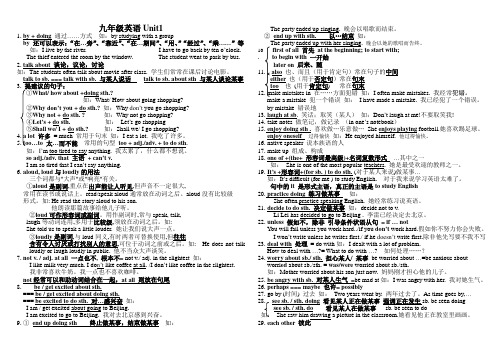
九年级英语Unit11. by + doing通过……方式如:by studying with a groupby 还可以表示:“在…旁”、“靠近”、“在…期间”、“用、”“经过”、“乘……”等如:I live by the river. I have to go back by ten o’clock.The thief entered the room by the window. The student went to park by bus.2. talk about 谈论,议论,讨论如:The students often talk about movie after class. 学生们常常在课后讨论电影。
talk to sb. === talk with sb. 与某人说话talk to sb. about sth 与某人谈论某事3. 提建议的句子:①What/ how about +doing sth.?如:What/ How about going shopping?②Why don’t you + do sth.?如:Why don’t you go shopping?③Why not + do sth. ? 如:Why not go shopping?④Let’s + do sth. 如:Let’s go shopping⑤Shall we/ I + do sth.?如:Shall we/ I go shopping?4. a lot 许多= much 常用于句末如:I eat a lot. 我吃了许多。
5. too…to 太…而不能常用的句型too + adj./adv. + to do sth.如:I’m too tired to say anything. 我太累了,什么都不想说。
so adj./adv. that 主语+ can’t v.I am so tired that I can’t say anything.6. aloud, loud与loudly的用法三个词都与"大声"或"响亮"有关。
新人教版九年级英语Unit1---14单元知识点总结
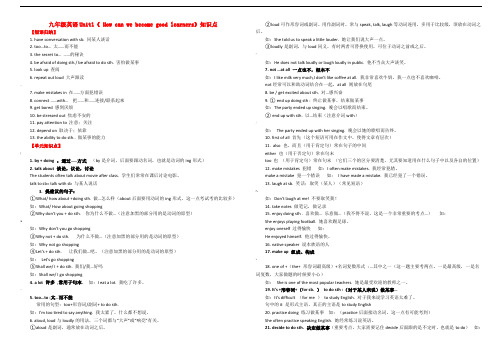
九年级英语Unit1《 How can we become good learners》知识点【短语归纳】1. have conversation with sb. 同某人谈话2. too…to…太……而不能3. the secret to………的秘诀4. be afraid of doing sth./ be afraid to do sth. 害怕做某事5. look up 查阅6. repeat out loud 大声跟读…7. make mistakes in 在……方面犯错误8. connect ……with…把……和……连接/联系起来9. get bored 感到厌烦10. be stressed out 焦虑不安的11. pay attention to 注意;关注12. depend on 取决于;依靠13. the ability to do sth.. 做某事的能力【单元知识点】(1. by + doing :通过……方式(by是介词,后面要跟动名词,也就是动词的ing形式)2. talk about 谈论,议论,讨论The students often talk about movie after class. 学生们常常在课后讨论电影。
talk to sb= talk with sb 与某人说话3. 提建议的句子:①What/ how about +doing sth.做…怎么样(about后面要用动词的ing形式,这一点考试考的比较多)如:What/ How about going shopping②Why don't you + do sth. 你为什么不做…(注意加黑的部分用的是动词的原型)&如:Why don't you go shopping③Why not + do sth. 为什么不做…(注意加黑的部分用的是动词的原型)如:Why not go shopping④Let's + do sth.让我们做…吧。
人教版初中九年级英语Unit1-Unit2知识梳理

7. 老师说得太快了,以至于大部分时间我都理解 不了她的话。 The teacher spoke _so_ _q_u_i_c_k_ly_ _t_h_a_t I did not understand her most of the time.
8. 我发现听有趣的东西是语言学习的秘诀。 I discovered that l_i_st_e_n_i_n_g_to _so_m__e_t_h_in_g_ _i_n_te_r_e_s_ti_n_g_is the secret t_o_language learning. 9. 我没有一位可以一起练习英语的搭档。 I don't have a partner _to_ _p_r_a_ct_i_c_e _E_n_g_l_is_h_ _w_i_th_.
25.处罚;惩罚 v. _p_u_n_i_sh_→n. 惩罚 _p_u_n_i_s_h_m_e_n_t_ 26.温暖;暖和n. _w_a_r_m__th_→adj. _w__a_rm__ 27.传播;展开 v. 蔓延;传播n. s_p_r_e_a_d_→ (过去式/过去分词) _sp_r_e_a_d_
重点短语 1. 查阅;抬头看 _lo_o_k__u_p_
2.天生具有 b__e_b_o_r_n__w_i_th_ 3.关注;注意 _p_a_y_a_t_t_e_n_ti_o_n_t_o_
4.把……和……连接起来 _c_o_n_n_e_c_t_. _. _.w_i_t_h_ 5.增加(体重);发胖 _p_u_t__o_n
九年级 Unit1-Unit2
重点单词 1. 大声地;出声地 adv. a_l_o_u_d_→adv. 大声地 _lo_u_d_l_y_ 2.发音;读音n. _p_r_o_n_u_n_c_i_a_ti_o_n_→v. 发音 _p_r_o_n_o_u_n_c_e_ 3.有耐心的adj. 病人n. _p_a_t_i_en__t →n. 耐心 _p_a_t_ie_n_c_e_ 4.表情; 表达方式;表示n. _e_x_p_r_e_ss_i_o_n_→v. 表达 _e_x_p_r_e_ss_
人教版九年级1-2单元知识点
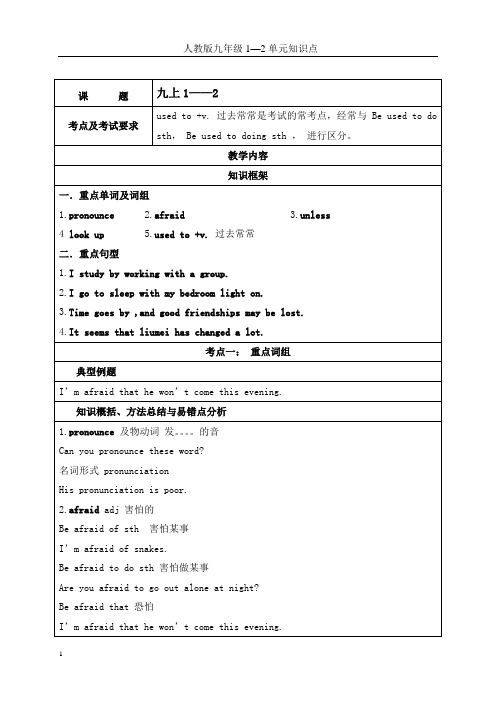
课题九上1——2考点及考试要求used to +v. 过去常常是考试的常考点,经常与Be used to do sth, Be used to doing sth ,进行区分。
教学内容知识框架一.重点单词及词组1.pronounce2.afraid3.unless 4 look up ed to +v. 过去常常二.重点句型1.I study by working with a group.2.I go to sleep with my bedroom light on.3.Time goes by ,and good friendships may be lost.4.It seems that liumei has changed a lot.考点一:重点词组典型例题I’m afraid that he won’t come this evening.知识概括、方法总结与易错点分析1.pronounce及物动词发。
的音Can you pronounce these word?名词形式 pronunciationHis pronunciation is poor.2.afraid adj 害怕的Be afraid of sth 害怕某事I’m afraid of snakes.Be afraid to do sth 害怕做某事Are you afraid to go out alone at night?Be afraid that 恐怕I’m afraid that he won’t come this evening.I’m afraid not.恐怕不是这样用以阐述对上述问题的看法或礼貌地说出令人不快、失望或感到遗憾的事。
Can you come home at five o’clock?I’m afrid not, I’ll be at a meeting at that time.3.unless conj. 如果不,除非用来引导条件状语从句“主将从现”You will be late unless you go there by bus=You will be late if you don’t go there by bus.4 look up (在词典、参考书等中)查阅、查找“动词+副词”构成的短语,若接代词做宾语,代词应放在look up之间。
(完整)新人教版九年级英语Unit1--14单元知识点总结,推荐文档
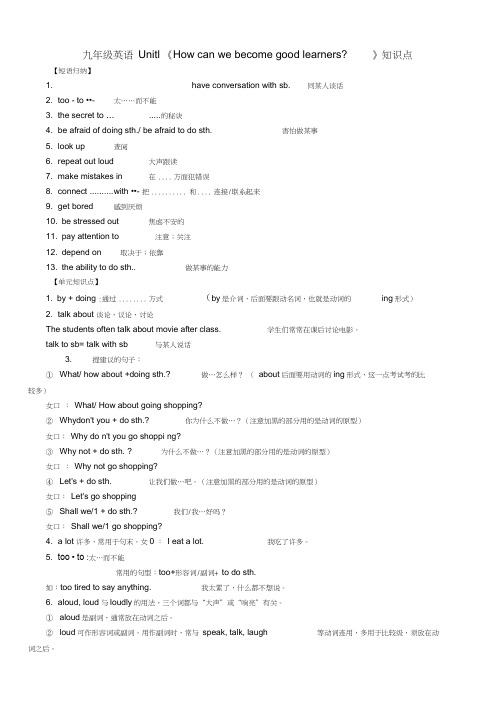
(for me ) to study English.对于我来说学习英语太难了
to study English
如:(practice后面接动名词,这一点有可能考到)
She often practice speaking English.
16.native speaker说本族语的人
17.make up组成、构成
18.one of+(the+形容词最高级)+名词复数形式:…其中之一(这一题主要考两点,一是最高级,一 是名词复数,大家做题的时候要小心)
如:She is one of the most popular teachers.她是最受欢迎的教师之一。
女口:Why do n't you go shoppi ng?
3Why not+do sth. ?为什么不做…?(注意加黑的部分用的是动词的原型)
女口 :Why not go shopping?
4Let's+do sth.让我们做…吧。(注意加黑的部分用的是动词的原型)
女口:Let's go shopping
not经常可以和助动词结合在一起,at all则放在句尾
8.be/get excited about sth.对…感兴奋
9.①end up doing sth:终止做某事,结束做某事
如:The party ended up singing.晚会以唱歌而结束。
②end up with sth.以…结束(注意介词with)
5Shall we/1+do sth.?我们/我…好吗?
人教版中考英语复习教材核心词汇知识点精讲精练九年级全册Unit1-Unit2

_n_o_v_e_l _b_u_s_in__es_s_ _w_a_r_n_ _p_r_e_se_n_t_ _sp__re_a_d_
【百变词汇】 1. aloud 大声地; 出声地adv.
→_lo_u_d_ adv. 大声地 adj. 大声的 → _lo_u_d__ly_ adv. 响亮地 2. pronunciation 发音; 读音 n. → _p_r_o_n_o_u_n_c_e_ v. 发音 3. discover 发现; 发觉 v. →_d_i_sc_o_v_e_r_y_ n. 发现 4. expression 表情; 表示; 表达方式n. → _e_x_p_r_e_ss_ v. 表达
_b_it_b__y_b_i_t _in__st_e_a_d_o_f_ _p_u_t _o_n_ _b_e_s_i_m_i_l_a_r_t_o_. _. _. _w_a_s_h__a_w_a_y_ _sh__o_o_t _d_o_w_n_ _fl_y_u_p_ _c_a_ll_o_u_t_
30. 摆开; 布置 31. 捉弄某人 32. 与……分享…… 33. (作为)结果 34. 盛装打扮 35. 关心; 在意 36. 最终成为; 最后处于 37. 唤醒; 叫醒 38. 不但……而且……
→_s_t_ra_n__g_e adj. 陌生的
→ _d_e_a_th_ n. 死; 死亡 → _d_ie_ v. 死; 死亡 →__tr_a_d_i_t_io_n_a_l_adj. 传统的 → _a_d_m_i_r_a_t_io_n_ n. 羡慕 →_p_u_n_i_s_h_m_e_n_t_ n. 惩罚 →_w_a_r_m_ adj. 温暖的
课本原句 The more you read, the faster you’ll be. 你读得越多, 你就会(读得)
(完整word版)人教版九年级英语各单元知识点总结

(完整word版)人教版九年级英语各单元知识点总结亲爱的读者:本文内容由我和我的同事精心收集整理后编辑发布到文库,发布之前我们对文中内容进行详细的校对,但难免会有错误的地方,如果有错误的地方请您评论区留言,我们予以纠正,如果本文档对您有帮助,请您下载收藏以便随时调用。
下面是本文详细内容。
最后最您生活愉快 ~O(∩_∩)O ~九年级英语全册各单元知识点总结Unit 1 How can we become good learners?一、短语:1.have conversation with sb. 同某人谈话2.connect …with… 把…和…连接/联系起来3.the secret to… ……的秘诀4.be afraid of doing sth./to do sth. 害怕做某事5.look up 查阅6.repeat out loud 大声跟读7.make mistakes in 在……方面犯错误8.get bored 感到厌烦9.be stressed out 焦虑不安的10.pay attention to 注意;关注11.depend on 取决于;依靠12.the ability to do sth. 做某事的能力二、知识点:1. by + doing:通过……方式(by是介词,后面要跟动名词,也就是动词的ing形式);2. a lot:许多,常用于句末;3. aloud, loud与loudly的用法,三个词都与“大声”或“响亮”有关。
①aloud是副词,通常放在动词之后。
②loud可作形容词或副词。
用作副词时,常与speak, talk, laugh等动词连用,多用于比较级,须放在动词之后。
③loudly是副词,与loud同义,有时两者可替换使用,可位于动词之前或之后。
4. not …at a ll:一点也不,根本不,not经常可以和助动词结合在一起,at all 则放在句尾;5. be / get excited about sth.:对…感到兴奋;6. end up doing sth:终止/结束做某事;end up with sth.:以…结束;7. first of all:首先(这个短语可用在作文中,使得文章有层次);8. make mistakes:犯错make a mistake 犯一个错误;9. laugh at sb.:笑话;取笑(某人)(常见短语)10. take notes:做笔记/记录;11. native speaker 说本国语的人;12. make up:组成、构成;13. deal with:处理、应付;14. perhaps = maybe:也许;15. go by:(时间)过去;16.each other:彼此;17.regard… as … :把…看作为…;18.change… into…:将…变为…;19. with the help of sb. = with one's help 在某人的帮助下(注意介词of和with,容易出题)20. compare … to …:把…比作…compare with 拿…和…作比较;21. instead:代替,用在句末,副词;instead of sth / doing sth:代替,而不是(这个地方考的较多的就是instead of doing sth,也就是说如果of后面跟动词时,要用动名词形式,也就是动词的ing形式)22.Shall we/ I + do sth.? 我们/我…好吗?23. too…t o:太…而不能,常用的句型是too+形容词/副词+ to do sth.Unit 2 I think that moon cakes are delicious!一、短语:1. the Lantern Festival 元宵节2. the Dragon Boat Festival 端午节3. the Water Festival 泼水节4. remind sb. of 使某人想起5. eat five meals a day 一天吃五餐6. put on five pounds 体重增加了五磅7. treat sb. with. 用/以……对待某人8. be similar to... 与.......相似9. end up 最终成为/处于10. share sth. with sb. 与……分享……11. as a result结果12. one... the other... (两者中的) 一个…另一个…13. take sb. out for dinner 带某人出去吃饭14. dress up 乔装打扮15. haunted house 鬼屋16. the beginning of new life 新生命的开始二、知识点:1.宾语从句:(三大考点:引导词、时态和语序。
人教版九年级上册英语各单元语法重点梳理
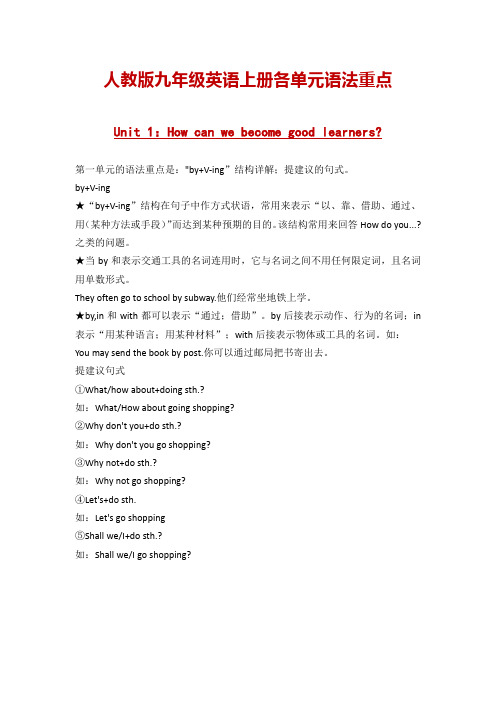
人教版九年级英语上册各单元语法重点Unit 1:How can we become good learners?第一单元的语法重点是:"by+V-ing”结构详解;提建议的句式。
by+V-ing★“by+V-ing”结构在句子中作方式状语,常用来表示“以、靠、借助、通过、用(某种方法或手段)”而达到某种预期的目的。
该结构常用来回答How do you...?之类的问题。
★当by和表示交通工具的名词连用时,它与名词之间不用任何限定词,且名词用单数形式。
They often go to school by subway.他们经常坐地铁上学。
★by,in和with都可以表示“通过;借助”。
by后接表示动作、行为的名词;in 表示“用某种语言;用某种材料”;with后接表示物体或工具的名词。
如:You may send the book by post.你可以通过邮局把书寄出去。
提建议句式①What/how about+doing sth.?如:What/How about going shopping?②Why don't you+do sth.?如:Why don't you go shopping?③Why not+do sth.?如:Why not go shopping?④Let's+do sth.如:Let's go shopping⑤Shall we/I+do sth.?如:Shall we/I go shopping?Unit 2:I think that mooncakes are delicious!第二单元的语法重点是:宾语从句;反义疑问句;表达“花费”。
宾语从句that,if和whatever引导的宾语从句:★宾语从句中连接词的选择1.由that引导的宾语从句:that在从句中无词义,不作任何成分,常可省略。
如:Jenny said(that)she could finish her painting before supper.I think(that)you are right.2.由if或whether引导的宾语从句:if或whether引导宾语从句时,一般可通用,都表示“是否”。
Unit1-unit2知识点讲义人教版英语九年级全册

九年级unit1unit2知识点复习练习Unit1知识点复习一.by+doing通过某种方式做某事1.I want to learn French by _________(watch) movies.2.I got this information by __________(read) newspapers.3.My writing also improves by_________(take) notes, doing exercises and reading a lot.4.—How do you study for a test? ______working with friends.A By B. with5.一How do you improve your listening? I improve it by __________.A.watchB.watching English movies.C to watch English movies.二.What about (doing) sth? =How about (doing) sth?"....怎么样?1.what about__________(join) the basketball club?②How about __________(play) with my classmates?三.It's +adj+(for sb)+to do sth (it做形式主语) “对某人来说做什么是怎么样的?”主语+谓语+it+adj +to do sth(it做形式宾语)1.The teacher told us that it was a good habit _________in every class.A.to take notesB.take a noteC.take notes2.I find______very important to study English well.A.itsB.it c.this.3.It's too hard ________understand spoken EnglishC.for.4.It is important_____people _____learn team spiritsA.of;of.B.of: to.C.for;to.四.疑问词+不定式结构(to do sth)1.I don't know how _______(pronounce) the word2.Mary doesn't know how ________mas.(逗号)A . use B. to use ed.五.W hether or not引导名词性从句,表示"是否""无论"1.No one knows_____or not Tom can arrive on time.Unit2知识点练习宾语从句定义:当用一个句子充当宾语时,我们把这个句子叫做宾语。
人教版九年级英语全册(Unit 1-Unit 13)知识点归纳

人教版九年级英语全册(Unit 1-Unit 13)知识点归纳Unit 1 How can we become good learners?短语总结:1. good learners 优秀的学习者2. work with friends 和朋友一起学习3. study for a test 备考4.have conversations with 与……交谈5.speaking skills 口语技巧6.a little 有点儿7.at first 起初起先8.the secret to......, .......的秘诀9.because of 因为10.as well 也11.look up (在词典中等)查阅;抬头看12.so that 以便,为了13.the meaning of ……的意思14.make mistakes 犯错误15.talk to 交谈16.depend on 依靠依赖17.in common 共有的18.pay attention to 注意关注19.connect ……with ……把……联系。
20.for example 例如21.think about 考虑22.even if 即使尽管纵容23.look for 寻找24.worry about 担心担忧25.make word cards 制作单词卡片26.ask the teacher for help 向老师求助27.read aloud 大声读28.spoken english 英语口语29.give a report 作报告30.word by word 一字一字地31.so……that 如此……以至于32.fall in love with 爱上33.something interesting 有趣的事情34.take notes 记笔记35.how often 多久一次36.a lot of 许多37.the ability to do sth. 做某事的能力38.learning habits 学习习惯39.be interested in 对……感兴趣40.get bored 感到无聊41.be good at 在……方面擅长42.be afraid of 害怕43.each other 彼此互相44.instead of 代替而不是二.用法集萃1. by doing sth 通过做某事2.it +be+adj+to do sth 做某事是……的3.finish doing sth 完成某事4.what about doing sth?做某事怎么样?5.try to do sth 尽力做某事6.the +比较近,the+比较近越……,就越……7.find it+adj+to do sth 发现做某事8.be afraid of doing sth 害怕做某事9.help sb (to) do sth 帮助某人做某事10.practice doing sth 练习做某事11.keep doing sth 一直做某事12.be afraid to do sth 害怕做某事13.begin to do sth 开始做某事14.want to do sth 想要做某事15.need to do sth 需要做某事16.remember to do sth 记得做某事17.shoot 射(射着,射死等表结果)18.shoot at(瞄准)射书面表达(一)假如你是张晓华,下面是你的笔友李军给你写的一封电子邮件。
(全)人教九年级上册英语Unit1-2单元知识点考点总结梳理
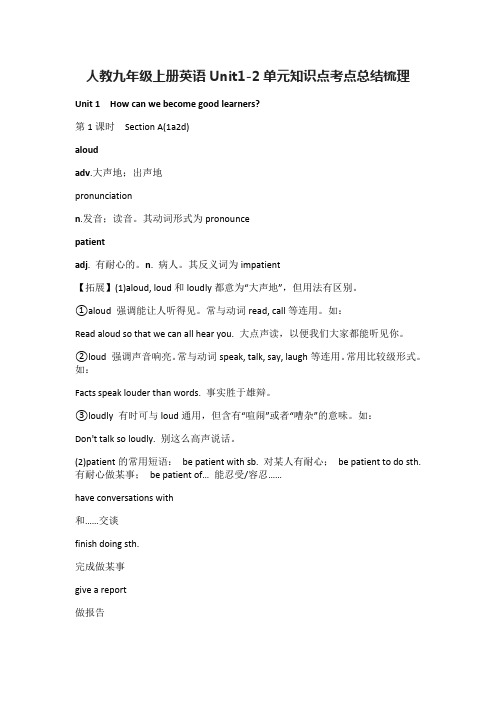
人教九年级上册英语Unit1-2单元知识点考点总结梳理Unit 1How can we become good learners?第1课时Section A(1a2d)aloudadv.大声地;出声地pronunciationn.发音;读音。
其动词形式为pronouncepatientadj. 有耐心的。
n. 病人。
其反义词为impatient【拓展】(1)aloud, loud和loudly都意为“大声地”,但用法有区别。
①aloud 强调能让人听得见。
常与动词read, call等连用。
如:Read aloud so that we can all hear you. 大点声读,以便我们大家都能听见你。
②loud 强调声音响亮。
常与动词speak, talk, say, laugh等连用。
常用比较级形式。
如:Facts speak louder than words. 事实胜于雄辩。
③loudly 有时可与loud通用,但含有“喧闹”或者“嘈杂”的意味。
如:Don't talk so loudly. 别这么高声说话。
(2)patient的常用短语:be patient with sb. 对某人有耐心;be patient to do sth. 有耐心做某事;be patient of… 能忍受/容忍……have conversations with和……交谈finish doing sth.完成做某事give a report做报告word by word逐字/词地☆It's too hard to understand spoken English.理解英语口语太难了。
“It is+adj.+to do sth.”结构,it在句中作形式主语,真正的主语是动词不定式的内容。
如:He speaks in a low voice. It's too hard to hear him clearly. 他说话声音很低,太难听清楚他说什么了。
人教版九年级英语unit1 unit2短语总结

Unit1 How can we become good learners?一.重点短语1. ask sb. for help 请求某人的帮助be patient 耐心点儿2.improve one’ s speaking skills 提髙某人说的能力3. spoken English=oral English英语口语4. make word cards 制作单词卡片5. listen to tapes 听磁带6. the secret to language learning 语言学习的诀窍7. be afraid to do sth害怕做某事8. fall in love with.. .爱上9. body language 肢体语言10. take notes 记笔记11. make mistakes in grammar 犯语法错误12. learning habits 学习习惯13. have sth. in common 有...共同点14. pay attention to 注意15. connect…with…把....与....联系起来16. write down key words 摘抄重点词17. in class 在课堂上after class 课后18. be interested in… 对.......感兴趣19. do sth. on one’s own 独立做某事20. worry about 为...而担忧21. depend on=rely on 依赖;取决于Unit 2 I think that mooncakes are delicious!一.重点短语1. the Lantern Festival 元宵节2. the Dragon Boat Festival 端午节3. the Water Festival 泼水节4. eat five meals a day 一天吃五餐5. put on five pounds 体重增加了五磅lose weight减肥6. in two weeks 两星期之后7. be similar to... 与.......相似8. throw water at each other 互相泼水9. in the shape of... 呈…的形状10. folk stories民间传说故事11. lay out摆开;布12. the story of Chang,e嫦娥的故事13. refuse to do sth 拒绝做某事14. have good luck in the new year在新的一年里有好运气15. end up最终成为;最后处于end up with以…结束16. share sth with sb 与…分享… 17. as a result结果18. one ... the other... (两者中)一个…另一个… 19. c are about 关心20. dress up 乔装打扮21. haunted house 鬼屋22. play a trick on sb.捉弄某人23. give out 分发giveup放弃24. trick or treat (万圣节用语)不给糖果就捣蛋25. light candles 26. the importance of…的重要性27. take sb around…=show sb around…带某人到处走走28. warn sb to do sth.警告某人做某事warn sb not to dosth警告某人不要做某事29. the beginning of new life 新生命的开始30. remindsb of … 使某人回想起…31. promise to do sth.承诺做某事32. treat sb. with. 用/以…款待某人Unit 3 Could you please tell me where the restrooms are?一.重点短语1.a pair of 一对,一双,一副2.between A and B在a和b之间3.on one’s / the way to 在去……的路上4.pardonme 什么,请再说一遍5.pass by 路过经过6.look forward to 盼望期待7.excuse me 打扰了请原谅8.get some magazines得到一些杂志9.get some information about 获取有关……的一些信息10.turn left\right 向左\向右转11.go past 经过路过12.a little earlier 早一点儿13.a good place to eat一个吃饭的好地方14.in different situation 在不同的情况下15.on time 准时按时16.get to 到达17.have dinner 吃晚餐18.on one’s / \the right在右边e on 快点请过来20.the shoppingcenter 购物中心21.the corner of....... 的角落/拐角处22.leadinto 导入引入二.用法集萃1.Not…· until…直到…才… You never know until youtry something.2.let’s do sth 咱们做某事吧!3.spend time doing sth 话费时间做某事4.thank sb for doing sth 为做某事而感谢某5.would like to do sth 想要做某事6.look forward to doing sth 盼望做某事7. It seems (that)…It seems a rock band plays there everyevening.8. Could you please tell me... ?Could you please tell me how to get to the post office?9.take的用法①take some food take some medicine (=have吃,喝)②take notes做笔记③take one’stemperature ( 测量)④It takes sb some time/money to do something (花费,需要)⑤I’ll take this coat.(=buy购买)⑥take somebody / something to (带领,拿去,取)⑦take a train to Chongqing (乘坐)⑧take off(脱下)10.turn 的用法turn to page 80 翻到It is your turn.轮到你了。
Units1-2单元高频考点总结2024-2025学年人教版英语九年级全册

九全1-2单元1.-How do you study for a test?你如何为考试而学习?-I study by working with a group.我通过小组合作学习。
知识点:询问及回答做事方式的句型1)对方式状语提问,用疑问词how.2)by doing...结构中,介词by意为“通过”,其后接动名词(短语),构成介词短语,作状语,常用来表达做某事的方式。
by意为“通过,以……的方式”。
后面接动名词或名词。
接交通工具时名词前不用冠词with意为“用,拿着,与……一起”。
后面可接表示工具或人物或身体部位的名词in意为“用”。
接表示语言或颜色的名词2.I 've put on five pounds!我已经胖了5磅了!知识点:put on 增加(体重);发胖1)put on的三种含义①增加(体重);发胖②穿上;戴上③上演2)put on 是动副短语,若其宾语是名词时,放在put与on的中间或其后面,若其宾语是代词时,放在put与on的中间。
【拓展延伸】常见由put构成的其他短语1)put up张贴;挂起;搭建2)put off 推迟;拖延3)put out熄灭;扑灭4)put away放好;收好3.One Christmas Eve, Scrooge sees the ghost of Jacob Marley, his dead business partner.有一年的圣诞前夜,斯克鲁奇见到了他已故的生意伙伴雅各布·马利的灵魂。
dead形容词,表示“死的;无生命的”。
die不及物动词,表示“死、死亡”。
dying die的现在分词,也可作形容词,表“垂死的,濒于死亡边缘的,枯萎的”之意。
death名词,表示“死、死亡”。
【温馨提示】die是非延续性动词,不能与表示一段时间的时间状语连用。
4.He warns Scrooge to change his ways if he doesn’t want to end up like him.他警告斯克鲁奇如果不想落到和他一样的下场的话就要改变他的方式。
人教版九年级英语 Unit 1、Unit 2 重要语法知识点总结
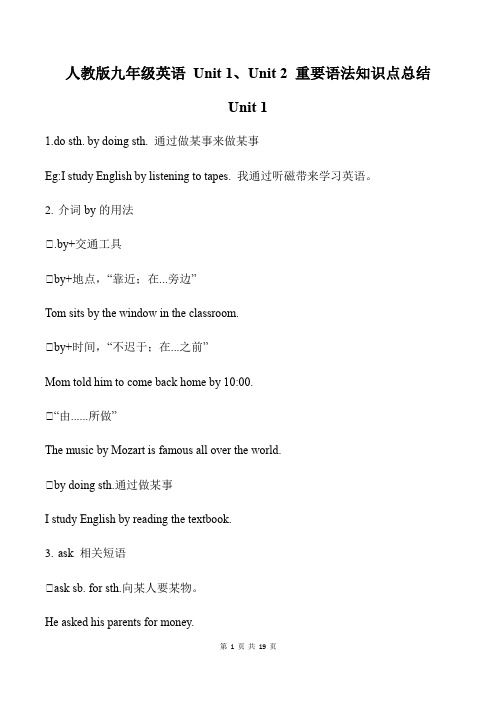
人教版九年级英语Unit 1、Unit 2 重要语法知识点总结Unit 11.do sth. by doing sth. 通过做某事来做某事Eg:I study English by listening to tapes. 我通过听磁带来学习英语。
2.介词by的用法①.by+交通工具①by+地点,“靠近;在...旁边”Tom sits by the window in the classroom.①by+时间,“不迟于;在...之前”Mom told him to come back home by 10:00.①“由......所做”The music by Mozart is famous all over the world.①by doing sth.通过做某事I study English by reading the textbook.3.ask 相关短语①ask sb. for sth.向某人要某物。
He asked his parents for money.①ask sb. about sth.向某人询问某事Can I ask about the result of the match?我可以问一下比赛的结果吗?①ask sb.(not) to do sth.要求某人(不)做某事(被动语态)--be asked (not) to do sth.被要求(不)做某事My mother asked me not to play in the street.4.have conversations with friends in English和朋友用英语交谈5.speaking skills 口语技能spoken English 英语口语6.read aloud 朗读 a little nervous 有点儿紧张7.It’s +adj.+(for sb.)+to do sth.做某事对某人来说是怎么样的。
人教版英语九年级全册 Units1-2单元知识总结

九年级人教版英语各单元重点短语及句型Unit 1-Unit 2Unit1 How can we become good learners?一、重点短语1.ask sb. for help 请求某人的帮助; ask sb. for sth. 向某人要某物2.by doing sth.通过做某事\以做某事的方式3.improve one’s speaking skills 提高某人的说话技巧;one’s使用时换成相应的形容词性物主代词。
4.spoken English=oral English 英语口语5.make word cards 制作单词卡片6.listen to tapes 听磁带;listen to music听音乐7.the secret to language learning 语言学习的秘诀\诀窍8.be afraid to do sth. 不敢做某事、害怕做某事9.fall in love with...爱上...;后面既可以接人也可以接物10.body language 肢体语言11.take notes做笔记12.write down 写下13.make mistakes in grammar 犯语法错误;make mistakes犯错14.learning habits学习习惯15.have sth. in common 在某方面有共同点;have nothing incommon没有共同点16.pay attention to注意、关注、关心、留心17.connect…with…把...和...联系起来18.key words关键词19.in class课堂上20.after class课后21.be interested in…对...感兴趣22.worry about担心23.depend on取决于、依赖于24.good learners好的语言学习者25.work with friends和朋友一起学习26.study for a test 为考试而学习27.have conversations with... 与...对话28.speaking skills口语技巧29.the meaning of... ...的意思30.be patient 耐心点儿31.learn...from...向\从...中学习32.learn to do sth.学会做某事二、用法集合1.by doing sth 通过做某事2.find .it +be+adj+to do sth. 发现做某事是……的3.finish doing sth. 完成某事4.what about doing sth.?做某事怎么样?5.try to do sth. 尽力做某事6.the +比较近,the+比较近越……,越……7.find it+adj+to do sth. 发现做某事8.be afraid of doing sth. 害怕做某事9.help sb (to) do sth. 帮助某人做某事10.practice doing sth. 练习做某事11.keep doing sth. 一直做某事12.be afraid to do sth. 害怕做某事13.begin to do sth. 开始做某事14.want to do sth. 想要做某事15.need to do sth. 需要做某事16.remember to do sth. 记得做某事三、重点句型1.What about doing sth ? = How about doing sth.? 用于提建议例如:For your next vacation , what about going to Beijing with me ?2.by的用法a.介词,(指交通等)乘;例如:The students in People’s school usually go to school by bus.It is a good way to go to Shanghai by subway.b.表示做某事的方式、方法等,by后面接动词ing形式。
九年级英语1-3单元知识点人教版

九年级英语1-3单元知识点人教版Unit 1 How can we become good learners?一、重点单词。
1. textbook:n. 教科书;课本。
2. conversation:n. 交谈;谈话。
3. aloud:adv. 大声地;出声地(区别于loud,loud可作形容词或副词,侧重声音响亮;aloud强调出声,能让人听见)4. pronunciation:n. 发音;读音。
5. sentence:n. 句子。
6. patient:adj. 有耐心的;n. 病人(be patient with sb. 对某人有耐心)7. expression:n. 表达(方式);表示。
8. discover:v. 发现;发觉(指发现原本存在但不为人知的事物)9. secret:n. 秘密;秘诀;adj. 秘密的;保密的(the secret to... ……的秘诀)10. look up:查阅;抬头看(look up a word in the dictionary在字典里查单词)二、重点短语。
1. by working with friends:通过和朋友一起学习。
2. make word cards:制作单词卡片。
3. read aloud:大声朗读。
4. practice doing sth.:练习做某事。
5. be afraid to do sth.:害怕做某事(be afraid of doing sth. 担心会发生某事)6. fall in love with:爱上;与……相爱。
7. as well:也(用于肯定句末,相当于too)8. look up to:钦佩;仰慕。
9. take notes:记笔记。
10. make mistakes in:在……方面犯错误。
三、重点句型。
1. How do you study for a test? 你如何为考试而学习?- I study by listening to tapes. 我通过听磁带学习。
期中备考--人教版九年级全册unit 1+2核心考点梳理
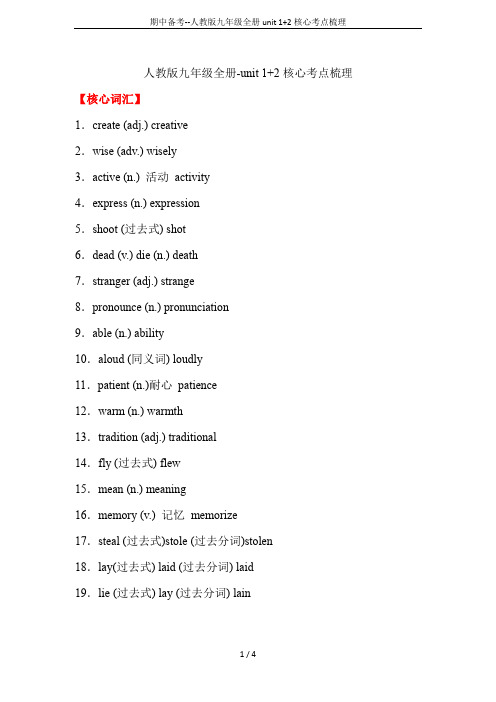
人教版九年级全册-unit 1+2核心考点梳理【核心词汇】1.create (adj.) creative2.wise (adv.) wisely3.active (n.) 活动activity4.express (n.) expression5.shoot (过去式) shot6.dead (v.) die (n.) death7.stranger (adj.) strange8.pronounce (n.) pronunciation9.able (n.) ability10.aloud (同义词) loudly11.patient (n.)耐心patience12.warm (n.) warmth13.tradition (adj.) traditional14.fly (过去式) flew15.mean (n.) meaning16.memory (v.) 记忆memorize17.steal (过去式)stole (过去分词)stolen18.lay(过去式) laid (过去分词) laid19.lie (过去式) lay (过去分词) lain【核心短语】1.结果;因此as a result2.大声叫喊call out3.想起;考虑think of4.和某人分享某物share sth.with sb.5.摆开;布置lay out6.最终成为;最后处于end up7.以……的形状in the shape of8.捉弄某人;开某人的玩笑play a trick on sb. 9.爱上……fall in love with10.写日记keep a diary11.即便even if/though12.有共同之处have...in common13.依靠depend on14.写下;记下write down 15.把……和……连接或联系起来connect...with 16.担心worry about17.因为;由于because of18.醒来wake up19.分发;发放give out20.使某人想起remind sb. of21.增加(体重);发胖put on22.好运气good luck23.与……相似be similar to24.冲走;洗掉wash away25.关心care about26.过去常常used to do sth.27.期望某人做某事expect sb.to do sth.28.逐词地word by word29.在……和……之间between...and...30.化装;打扮dress up31.查阅;抬头看look up32.做笔记take notes33.天生具有be born with34.注意;关注pay attention to【核心句型】1.我发现听一些有趣的东西是语言学习的秘诀。
- 1、下载文档前请自行甄别文档内容的完整性,平台不提供额外的编辑、内容补充、找答案等附加服务。
- 2、"仅部分预览"的文档,不可在线预览部分如存在完整性等问题,可反馈申请退款(可完整预览的文档不适用该条件!)。
- 3、如文档侵犯您的权益,请联系客服反馈,我们会尽快为您处理(人工客服工作时间:9:00-18:30)。
Unit 1 How can we become good learners? 一.重点短语
1. ask sb. for help 请求某人的帮助
2. improve one’s speaking skills 提髙某人说的能力
3. spoken English 英语口语
4. make word cards 制作单词卡片
5. read word by word 逐字逐句地读
6. the secret to language learning 语言学习的诀转
7. be afraid to do sth.不敢'做某事
8. look them up in a dictionary 在词典里查阅它们
9. take notes 记笔记
10. memorize sentence patterns 记句型
11. make mistakes in grammar 犯语法错误
12. learning habits 学习习惯
13. have sth. in common 有.......共同,点
14. pay attention to 注意
15. Connect... With... 把.......与.......联系起来
16. do sth. on one’s own 独立做某事
17. depend on 依赖;取决于
18.Practice makes perfect. 熟能生巧。
二、重点句型
1. What about listening to tapes?
2. How do you study for a test?
3. I study by making word cards.
4. The more you read, the faster you’ll be.
5.1 don’t know how to increase my reading speed.
6. Even if you learn something well, you will forget it unless you use it.
三.知识点串讲
一.--------How do you learn English? —I learn by studying with a group.
1.“by+doing形式”表示方式、方法
2.拓展:介词by的其他用法:
1)by+交通工具,“乘/坐...”by bus
2)by+地点,“在...的旁边;靠近...”by the lake
3)by+时间,“截止到...;不迟于...”by ten
【by短语】
by the way 顺便问一下by accident= by chance 偶然地by mistake 错误地one by one 一个接一个step by step 一步一步地little by little 逐渐地
by the time 到……为止by oneself 独自地by the end of 到….... 末尾3.辨析by、with、in,“用”
by 侧重“用”某种手段、交通工具、传递方式或媒介等
with 侧重“用”有形工具、材料、内容等
in 侧重“用”语言、语调、笔墨、颜色等
Eg. We’ll be traveling by car.
He broke the window with a stone.
Please answer the question in English.
练习:
1.-How do you learn English words? -_____making word cards.
A. To
B. By
C. For
D. With
2.-How do you get to school every day. Lucy? -I go to school _____.
A.ride my bike
B.by my bike
C.by bus
D.by a bus
3.Mr.Scott made a living by____(sell) old things.
二..疑问词how的用法
How +adj 构成的疑问词
How often______ How old_____ How far____ How soon______
How many_______ How much______ How long_____ How tall______
练习: 用How +adj 构成的疑问词填空
1.---_____ will it take you from your school to the library?---About half an hour.
2.--- _______ will you come back? ---In a week.
3.--- _________do you go to see your grandma? ---Once a week.
4.---__________ do you live from school? ---Three miles.
三.Do you have conversations with friends in English?
conversion“交谈;谈话”:have/hold a conversion with...“与...交谈/谈话”make conversion“闲谈;搭讪”be in a conversion with...“与...在谈话”Eg. He had a conversation with his son yesterday.。
